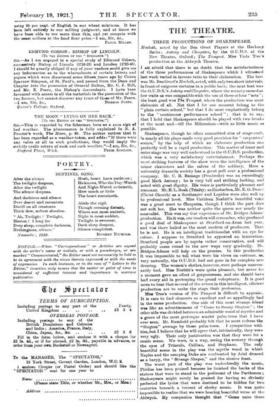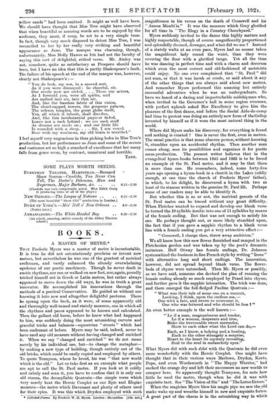THE THEATRE.
THREE PRODUCTIONS OF SHAKESPEARE.
Macbeth, acted lay the Ben Greet Players at the Hackney Baths ; Antony and Cleopatra, by the O.U.D.S. at the New Theatre, Oxford ; The Tempest, Miss Viola Tree's production at the Aldwych Theatre.
I AM afraid that there is no doubt that the satisfactoriness of the three performances of Shakespeare which I witnessed last week varied in inverse ratio to their elaboration. The best was Mr. Ben Greet's Macbeth, acted, with only two short intervals, in front of exiguous curtains in a public bath; the next best was the O.U.D.S.'s Antony and Cleopatra., where the scenery caused as few waits as was oompatiblewith the use of three or four "sets"; the least good was Ths Tempest, where the production was most elaborate of all. Not that I for one moment belong to the
" plain curtain school," but that I do most emphatically belong to the " continuous performance school " ; that is to say, that I hold that Shakespeare should be played with two breaks at the most and—till the Millennium—with as little music as possible.
Shakespeare, though he often committed sins of stage-craft, In nearly all his plays made very good provision for " carpenteis' scenes," by the help of which an elaborate production can perfectly well be a rapid production. This matter of inner and outer stage was very well understood in the O.U.D.S. production, which was a very satisfactory entertainment. Perhaps the most striking features of the show were the intelligence of the minor characters and the calves of the soldiery. Here a university dramatic society has a great pull over a professional company. Mr. C. B. Ramage (Pembroke) was an exceedingly good Mark Antony ; he is very tall and striking looking, and acted with great dignity. His voice is particularly pleasant and resonant. Mr. E. L. Bush (Trinity) as Enobarbus, Mr. E. G. Dance (Christ Churoh) as a Soothsayer and Lepidus were also well up to professional level. Miss Cathleen Nesbitt's beautiful voice was a great asset to Cleopatra, though I think the part does not suit her. She was neither quite the queen nor nearly the sensualist. This was my first experience of Mr. Bridges-Adams' production. He it was, our readers will remember, who produced a good deal of Shakespeare at Stratford-on-Avon last year, and was there hailed as the most modern of producers. That he is not. He is an intelligent traditionalist with an eye for colour. I suppose to Stratford he appeared an innovation. Stratford people are by repute rather conservative, and will probably come round to the new ways very gradually. Mr. Bridges-Adams will help on the process. In this production it was impossible to tell what were his views on costume, as, very naturally, the O.U.D.S. had not gone in for complete new dressing. The women's clothes, however, were perhaps unneces- sarily bad. Miss Nesbitt's were quite pleasant., but never for a moment gave an effect of gorgeousness, and she should have had every aid in portraying the grand voluptuary. It is good news to hear that several of the actors in this intelligent, efficient production are to make 'the stage their profession.
Miss Tree's version of The Tempest is difficult to appraise. It is rare to find elements so excellent and so appallingly bad in the same production. One side of this most strange island was like an advertisement of " Come to Sunny Slugton " ; the other side was divided between an admirable wood of myrtles and a grove of the most grotesque scarlet palm-trees that I have ever seen. Mr. Rumbold probably felt that he must redress the "Slugton" average by these palm-trees. I sympathize with him, but I believe that he will agree that, intrinsically, they were very ugly. Their only justification was that they were for a comic scene. We were, in a way, seeing the scenery through the eyes of Trinoulo, Caliban, and Stephan. The only beautiful scene in the play was the myrtle wood in which Naples and the usurping Duke are confronted by Ariel dressed as a harpy, the " Strange Shapes," and the elusive feast.
The worst part of the play was undoubtedly the music. Phidias has been praised because he finished the backs of the statues that were to stand in the pediment of the Parthenon ; Shakespeare might surely be praised for having so divinely perfected the lyrics that were destined to be hidden for two centuries beneath a torrent of slushy music. It was quite impossible to realize that we were hearing beautiful verse at the Aldwych. My companion thought that " Come unto these yellow sands " had been omitted It might as well have been. We should have thought that Miss Tree might have observed that when beautiful or amusing words are to be enjoyed by the audience, they must, if sung, be set to a very simple tune.
In fact, though very much disposed to detest Miss Tree, I was reconciled to her by her really very striking and beautiful appearance as Juno. The masque was charming, though, unfortunately, Miss Molly Hawes as Iris had not the faculty of saying this sort of delightful, stilted verse. Mr. Ainley was not, somehow, quite as satisfactory as Prospero should have been, but I have an idea that this is partly Shakespeare's fault.
The failure of his speech at the end of the masque was, however, clearly not Shakespeare's :— " You do look, my son, in a moved sort,
As if you were dismayed : be cheerful, sir.
Our revels now are ended. . . . These our actors, As I foretold you, were all spirits, and Are melted into air, into thin air, And, like the baseless fabric of this vision, The cloud-capped towers, the gorgeous palaces, The solemn temples, the great globe itself, Yea, all which it inherit, shall dissolve, And, like this insubstantial pageant faded, Leave not a rack behind : we are such stuff As dreams are made on ; and our little life Is rounded with a sleep. . . . Sir, I am vexed- Bear with my weakness, my old brain is troubled."
I feel myself very ungracious in thus picking holes in Miss Tree's production, but her performance as Juno and some of the scenes and costumes set so high a standard of excellence that her many falls from grace seem, by contrast, unnatural and horrible.
TARN.



































 Previous page
Previous page